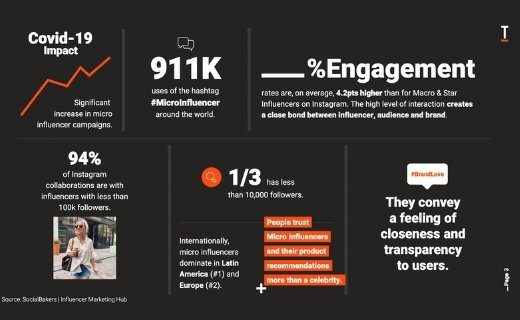Nearly two years after the sudden boom of TikTok, its popularity is still growing. It recently became “the first non-Facebook mobile app to surpass 3 billion downloads” – attracting thus various types of influencers.
TikTok, a growing marketing tool
According to Kantar’s second annual Media Reaction survey, TikTok ad’s exposure nearly doubled from 19% to 37% this year. The video-sharing app is more and more trusted by marketers because it is considered as a secured platform for creative and innovative ad content. Indeed, consumers think that the platform has “the most fun and entertaining ads” in 2021 compared to the traditional social media: YouTube or Facebook.
Micro influencers, an important asset for brands
TikTok is full of creative and spontaneous content creators which can be a real asset for marketers. In fact, on this social platform, becoming a micro influencer can happen very quickly. At least, much easier than on mature and crowded apps such as Instagram. This dynamic offers more and more choices to advertisers to reach their target groups in an authentic way. Especially the Gen Z consumers who remains a significant majority of the users. TikTok also turned into a real trendsetter with a high number of new products shared on its application. This led to the creation of the famous #TikTokMadeMeBuyIt hashtag – frequently used by micro influencers.
“Marketers’ high level of trust in influencers probably reflects a genuine desire for a new type of conversation with consumers and greater comfort with the idea of giving up some elements of control of their brand messaging,” Kantar said.
We all know how important it is to not neglect micro influencers, especially on TikTok. Over there we are all truly influencers, a video can go viral in a few seconds and gives unpredictably high visibility to a brand. Pacsun, for instance, has well understood this phenomenon by working with micro influencers to promote their gender-neutral clothing brand. Mobile app users are looking for reliability and authenticity as they are more likely to buy from someone they know (even through social media) and trust. This is why leveraging such type of content creators can be more engaging than a brand content or advertisement. Micro influencers have a personal contact and relationship with their audience, which makes them perceived as “people like me.”
“92% trust a micro influencer more than a traditional ad or an endorsement from celebrities.” MuseFind
Are you interested in more insights & data about micro influencers? Click below to download for free a document including the latest definition, researches and numerous campaign case studies about this specific category.


